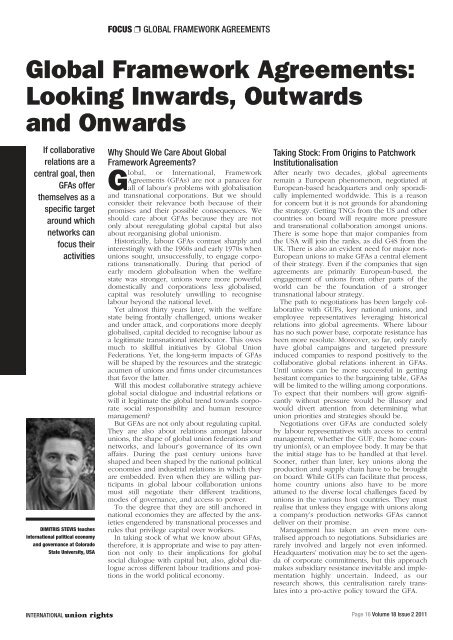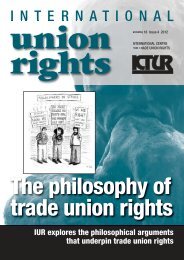Global Framework Agreements - International Centre for Trade ...
Global Framework Agreements - International Centre for Trade ...
Global Framework Agreements - International Centre for Trade ...
You also want an ePaper? Increase the reach of your titles
YUMPU automatically turns print PDFs into web optimized ePapers that Google loves.
<strong>Global</strong> <strong>Framework</strong> <strong>Agreements</strong>:Looking Inwards, Outwardsand OnwardsIf collaborativerelations are acentral goal, thenGFAs offerthemselves as aspecific targetaround whichnetworks canfocus theiractivitiesDIMITRIS STEVIS teachesinternational political economyand governance at ColoradoState University, USAFOCUS ❐ GLOBAL FRAMEWORK AGREEMENTSWhy Should We Care About <strong>Global</strong><strong>Framework</strong> <strong>Agreements</strong>?<strong>Global</strong>, or <strong>International</strong>, <strong>Framework</strong><strong>Agreements</strong> (GFAs) are not a panacea <strong>for</strong>all of labour’s problems with globalisationand transnational corporations. But we shouldconsider their relevance both because of theirpromises and their possible consequences. Weshould care about GFAs because they are notonly about reregulating global capital but alsoabout reorganising global unionism.Historically, labour GFAs contrast sharply andinterestingly with the 1960s and early 1970s whenunions sought, unsuccessfully, to engage corporationstransnationally. During that period ofearly modern globalisation when the welfarestate was stronger, unions were more powerfuldomestically and corporations less globalised,capital was resolutely unwilling to recogniselabour beyond the national level.Yet almost thirty years later, with the welfarestate being frontally challenged, unions weakerand under attack, and corporations more deeplyglobalised, capital decided to recognise labour asa legitimate transnational interlocutor. This owesmuch to skillful initiatives by <strong>Global</strong> UnionFederations. Yet, the long-term impacts of GFAswill be shaped by the resources and the strategicacumen of unions and firms under circumstancesthat favor the latter.Will this modest collaborative strategy achieveglobal social dialogue and industrial relations orwill it legitimate the global trend towards corporatesocial responsibility and human resourcemanagement?But GFAs are not only about regulating capital.They are also about relations amongst labourunions, the shape of global union federations andnetworks, and labour’s governance of its ownaffairs. During the past century unions haveshaped and been shaped by the national politicaleconomies and industrial relations in which theyare embedded. Even when they are willing participantsin global labour collaboration unionsmust still negotiate their different traditions,modes of governance, and access to power.To the degree that they are still anchored innational economies they are affected by the anxietiesengendered by transnational processes andrules that privilege capital over workers.In taking stock of what we know about GFAs,there<strong>for</strong>e, it is appropriate and wise to pay attentionnot only to their implications <strong>for</strong> globalsocial dialogue with capital but, also, global dialogueacross different labour traditions and positionsin the world political economy.Taking Stock: From Origins to PatchworkInstitutionalisationAfter nearly two decades, global agreementsremain a European phenomenon, negotiated atEuropean-based headquarters and only sporadicallyimplemented worldwide. This is a reason<strong>for</strong> concern but it is not grounds <strong>for</strong> abandoningthe strategy. Getting TNCs from the US and othercountries on board will require more pressureand transnational collaboration amongst unions.There is some hope that major companies fromthe USA will join the ranks, as did G4S from theUK. There is also an evident need <strong>for</strong> major non-European unions to make GFAs a central elementof their strategy. Even if the companies that signagreements are primarily European-based, theengagement of unions from other parts of theworld can be the foundation of a strongertransnational labour strategy.The path to negotiations has been largely collaborativewith GUFs, key national unions, andemployee representatives leveraging historicalrelations into global agreements. Where labourhas no such power base, corporate resistance hasbeen more resolute. Moreover, so far, only rarelyhave global campaigns and targeted pressureinduced companies to respond positively to thecollaborative global relations inherent in GFAs.Until unions can be more successful in gettinghesitant companies to the bargaining table, GFAswill be limited to the willing among corporations.To expect that their numbers will grow significantlywithout pressure would be illusory andwould divert attention from determining whatunion priorities and strategies should be.Negotiations over GFAs are conducted solelyby labour representatives with access to centralmanagement, whether the GUF, the home countryunion(s), or an employee body. It may be thatthe initial stage has to be handled at that level.Sooner, rather than later, key unions along theproduction and supply chain have to be broughton board. While GUFs can facilitate that process,home country unions also have to be moreattuned to the diverse local challenges faced byunions in the various host countries. They mustrealise that unless they engage with unions alonga company’s production networks GFAs cannotdeliver on their promise.Management has taken an even more centralisedapproach to negotiations. Subsidiaries arerarely involved and largely not even in<strong>for</strong>med.Headquarters’ motivation may be to set the agendaof corporate commitments, but this approachmakes subsidiary resistance inevitable and implementationhighly uncertain. Indeed, as ourresearch shows, this centralisation rarely translatesinto a pro-active policy toward the GFA.INTERNATIONAL union rightsPage 16 Volume 18 Issue 2 2011





